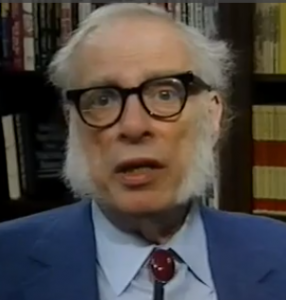Learning Science by Isaac Asimov

Learning Science
By Dr. Isaac Asimov
I imagine that many a young scholar has asked him- or herself, rebelliously, why on Earth s/he must learn science when s/he has no intention of being a scientist.
Someone who feels that may feel that s/he need know no more than the minimum that will allow him or her to just barely get through life. Why should one know history if one is not going to be a historian? Or geography or languages if one isn’t going to travel much?
But surely there is more to life than what one “does.” Even if one lives quietly at home and works at some simple, routine job, one must nevertheless be some value to understanding the world around us, to understanding events in light of the past, to having an appreciation of other place and other cultures.
In fact, it is surely fun to know things. It brightens one’s life, sharpens one’s wits, reduces one’s boredom, broadens one’s horizon, makes one more interesting and more pleasurable to be with. This is true of any sort of knowledge or skill, actually, even of those that are not strictly “school subjects.” Someone who knows how to carve wood into clever little devices, or who knows all about stamp collecting, is surely more fun to be with and to watch and listen to than someone who knows nothing at all.
If, then, you know these other things, do you have to know science, too? Is there something special about science?
Our modern world is founded on science—and on technology, which is the application of science to everyday affairs. Almost everything we do depends on our modern devices, such as automobiles, record players, and television sets, and these in turn depend on scientific principles. Our future will depend on computers, robots, nuclear power, rocket ships, all of which only make sense if we understand science.
If a person does not understand what makes these things work, they might as well be magic. People without science live in a mystery world that makes no sense to them. Even if they say, “So what? All I want to do is make a living, have a family, and look at the scenery,” they may find that it is not so easy. In an increasingly scientific world, the good jobs, the money-making jobs, will go to those who understand science.
Then, too, science has its dangers and its benefits. Used improperly, science can flood the Earth with pollution, with dangerous chemicals, with radiation, with devices that destroy our privacy and freedom. Used wisely, however, science can increase our energy and food supply, improve our health, expand our joy, extend our lives, and broaden our sense of security.
Who decides how best to use science, however? In a democracy, it should be the people generally. But how can the people come to an intelligent decision if hardly any of them know much about science to begin with?
Surely it will be increasingly important as the years pass, for people to understand science if they are going to be expected to make intelligent decisions about how to use science to save the world, and not destroy it.
That is why it is important to study science, even if one is not going to be a professional scientist.
Dr. Isaac Asimov is one of the most prolific writers of all time, having written or edited over 500 books and 9,000 letters. He is best known as the author of I, Robot and the Foundation series. He was the 1984 Humanist of the Year and honorary president of the American Humanist Association from 1985 until his death in 1992. This article was published with permission.
